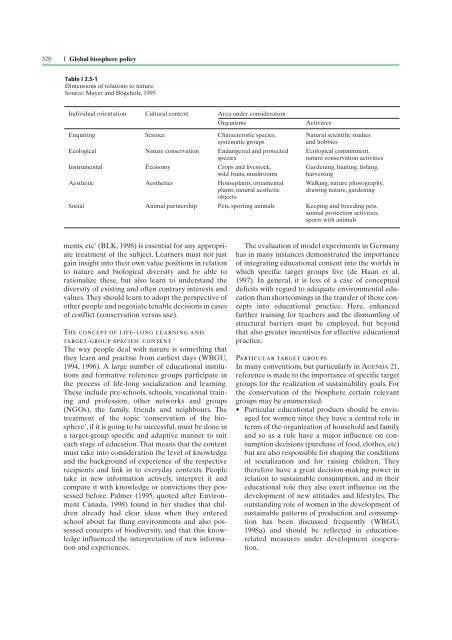Conservation and Sustainable Use of the Biosphere - WBGU
Conservation and Sustainable Use of the Biosphere - WBGU
Conservation and Sustainable Use of the Biosphere - WBGU
Create successful ePaper yourself
Turn your PDF publications into a flip-book with our unique Google optimized e-Paper software.
328 I Global biosphere policy<br />
Table I 2.5-1<br />
Dimensions <strong>of</strong> relations to nature.<br />
Source: Mayer <strong>and</strong> Bögeholz, 1995<br />
Individual orientation Cultural context Area under consideration<br />
Organisms<br />
Activities<br />
Enquiring Science Characteristic species, Natural scientific studies<br />
systematic groups<br />
<strong>and</strong> hobbies<br />
Ecological Nature conservation Endangered <strong>and</strong> protected Ecological commitment,<br />
species<br />
nature conservation activities<br />
Instrumental Economy Crops <strong>and</strong> livestock, Gardening, hunting, fishing,<br />
wild fruits, mushrooms harvesting<br />
Aes<strong>the</strong>tic Aes<strong>the</strong>tics Houseplants, ornamental Walking, nature photography,<br />
plants, natural aes<strong>the</strong>tic drawing nature, gardening<br />
objects<br />
Social Animal partnership Pets, sporting animals Keeping <strong>and</strong> breeding pets,<br />
animal protection activities,<br />
sports with animals<br />
ments, etc’ (BLK, 1998) is essential for any appropriate<br />
treatment <strong>of</strong> <strong>the</strong> subject. Learners must not just<br />
gain insight into <strong>the</strong>ir own value positions in relation<br />
to nature <strong>and</strong> biological diversity <strong>and</strong> be able to<br />
rationalize <strong>the</strong>se, but also learn to underst<strong>and</strong> <strong>the</strong><br />
diversity <strong>of</strong> existing <strong>and</strong> <strong>of</strong>ten contrary interests <strong>and</strong><br />
values. They should learn to adopt <strong>the</strong> perspective <strong>of</strong><br />
o<strong>the</strong>r people <strong>and</strong> negotiate tenable decisions in cases<br />
<strong>of</strong> conflict (conservation versus use).<br />
The concept <strong>of</strong> life-long learning <strong>and</strong><br />
target-group specific content<br />
The way people deal with nature is something that<br />
<strong>the</strong>y learn <strong>and</strong> practise from earliest days (<strong>WBGU</strong>,<br />
1994, 1996). A large number <strong>of</strong> educational institutions<br />
<strong>and</strong> formative reference groups participate in<br />
<strong>the</strong> process <strong>of</strong> life-long socialization <strong>and</strong> learning.<br />
These include pre-schools, schools, vocational training<br />
<strong>and</strong> pr<strong>of</strong>ession, o<strong>the</strong>r networks <strong>and</strong> groups<br />
(NGOs), <strong>the</strong> family, friends <strong>and</strong> neighbours. The<br />
treatment <strong>of</strong> <strong>the</strong> topic ‘conservation <strong>of</strong> <strong>the</strong> biosphere’,<br />
if it is going to be successful, must be done in<br />
a target-group specific <strong>and</strong> adaptive manner to suit<br />
each stage <strong>of</strong> education. That means that <strong>the</strong> content<br />
must take into consideration <strong>the</strong> level <strong>of</strong> knowledge<br />
<strong>and</strong> <strong>the</strong> background <strong>of</strong> experience <strong>of</strong> <strong>the</strong> respective<br />
recipients <strong>and</strong> link in to everyday contexts. People<br />
take in new information actively, interpret it <strong>and</strong><br />
compare it with knowledge or convictions <strong>the</strong>y possessed<br />
before. Palmer (1995, quoted after Environment<br />
Canada, 1998) found in her studies that children<br />
already had clear ideas when <strong>the</strong>y entered<br />
school about far flung environments <strong>and</strong> also possessed<br />
concepts <strong>of</strong> biodiversity, <strong>and</strong> that this knowledge<br />
influenced <strong>the</strong> interpretation <strong>of</strong> new information<br />
<strong>and</strong> experiences.<br />
The evaluation <strong>of</strong> model experiments in Germany<br />
has in many instances demonstrated <strong>the</strong> importance<br />
<strong>of</strong> integrating educational content into <strong>the</strong> worlds in<br />
which specific target groups live (de Haan et al,<br />
1997). In general, it is less <strong>of</strong> a case <strong>of</strong> conceptual<br />
deficits with regard to adequate environmental education<br />
than shortcomings in <strong>the</strong> transfer <strong>of</strong> those concepts<br />
into educational practice. Here, enhanced<br />
fur<strong>the</strong>r training for teachers <strong>and</strong> <strong>the</strong> dismantling <strong>of</strong><br />
structural barriers must be employed, but beyond<br />
that also greater incentives for effective educational<br />
practice.<br />
Particular target groups<br />
In many conventions, but particularly in AGENDA 21,<br />
reference is made to <strong>the</strong> importance <strong>of</strong> specific target<br />
groups for <strong>the</strong> realization <strong>of</strong> sustainability goals. For<br />
<strong>the</strong> conservation <strong>of</strong> <strong>the</strong> biosphere certain relevant<br />
groups may be enumerated:<br />
• Particular educational products should be envisaged<br />
for women since <strong>the</strong>y have a central role in<br />
terms <strong>of</strong> <strong>the</strong> organization <strong>of</strong> household <strong>and</strong> family<br />
<strong>and</strong> so as a rule have a major influence on consumption<br />
decisions (purchase <strong>of</strong> food, clo<strong>the</strong>s, etc)<br />
but are also responsible for shaping <strong>the</strong> conditions<br />
<strong>of</strong> socialization <strong>and</strong> for raising children. They<br />
<strong>the</strong>refore have a great decision-making power in<br />
relation to sustainable consumption, <strong>and</strong> in <strong>the</strong>ir<br />
educational role <strong>the</strong>y also exert influence on <strong>the</strong><br />
development <strong>of</strong> new attitudes <strong>and</strong> lifestyles. The<br />
outst<strong>and</strong>ing role <strong>of</strong> women in <strong>the</strong> development <strong>of</strong><br />
sustainable patterns <strong>of</strong> production <strong>and</strong> consumption<br />
has been discussed frequently (<strong>WBGU</strong>,<br />
1998a) <strong>and</strong> should be reflected in educationrelated<br />
measures under development cooperation.

















